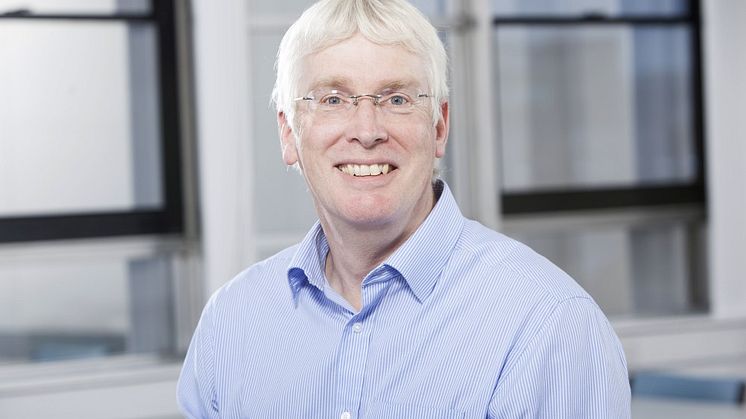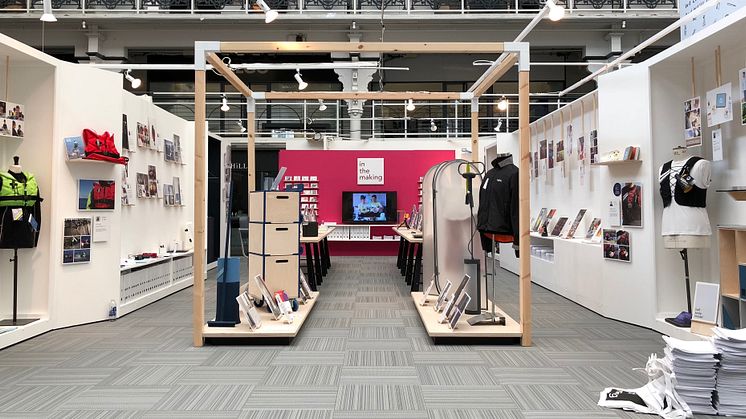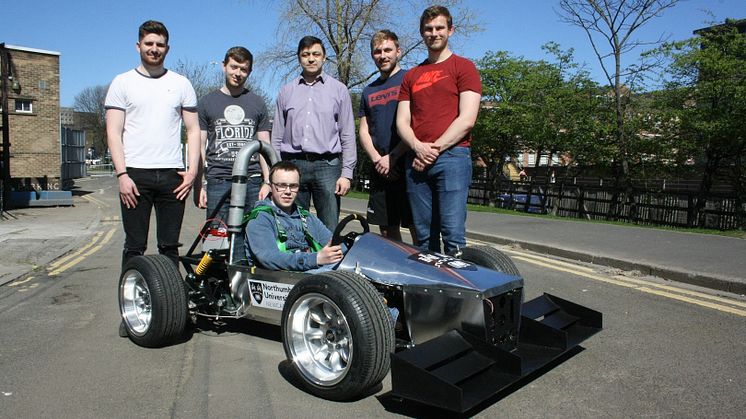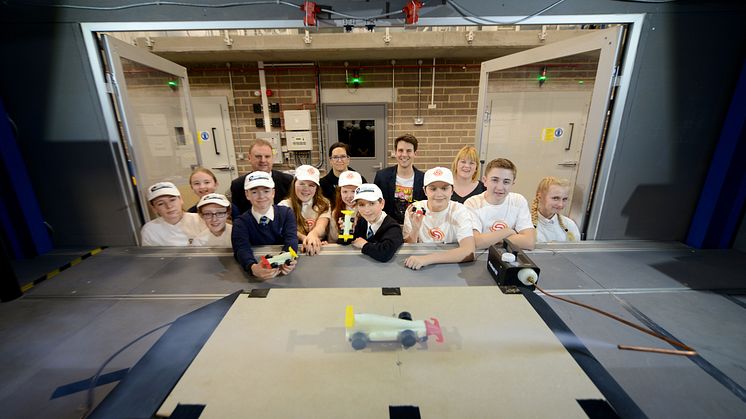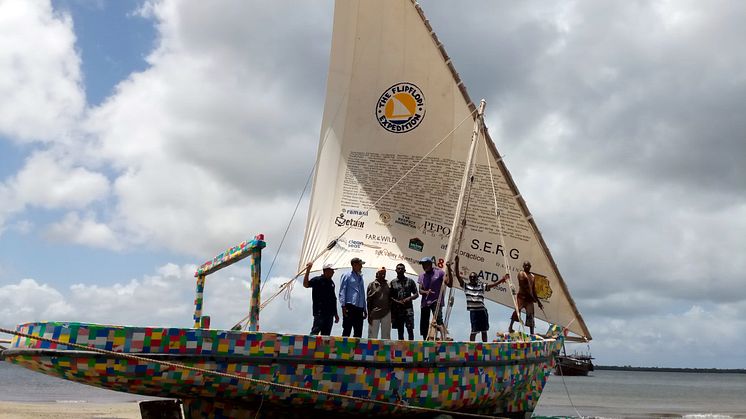
Press release -
Northumbria lecturer and former student set sail to raise awareness of plastic pollution in the Indian Ocean
A design expert from Northumbria University, Newcastle is helping to raise awareness of the impact single use plastic is having on the world’s oceans by helping to create a boat made entirely from rubbish collected from African beaches – including 30,000 flipflops.
Simon Scott-Harden, from Northumbria’s School of Design, is part of the team behind the Flipflopi – a traditional ‘dhow’ sailing boat made from plastic waste collected from Kenya’s beaches and towns.
Next week the boat will embark on its maiden voyage, sailing from Lamu in Kenya to Zanzibar in Tanzania – a 500-kilometre expedition, stopping at communities along the way to change mindsets about plastic waste.
The Kenyan-based project aims to highlight the potential for reuse of these harmful materials.
After coming across pieces of plastic, including flipflops, floating in the Indian Ocean, project founder Ben Morison, decided to research their effect on the environment and what other uses could be found for them.
He teamed up with renowned boat builder Ali Skanda, and a team of like-minded volunteers, to build a 9-metre traditional ‘dhow’ sailing boat, entirely from plastic waste collected on beach clean-ups along the Kenyan coast.
The project has been supported by Northumbria University, with designer expert Simon Scott-Harden part of the team behind the Flipflopi.
Simon, a Senior Lecturer in Design for Industry, used his product and material design skills to help bring the nine-metre long sailing boat to life. He worked alongside a design engineer to find the best way of processing and shaping the plastic to create the ‘dhow’ – a traditional sailing vessel which would normally be made from wood.
He will travel from Newcastle to Kenya next week to take part in the two-week expedition, which will see the boat and its crew depart from Lamu on January 24, stopping at six destinations along the way before arriving in Zanzibar on February 7.
“Every year 12.7 million tonnes of plastic enters our oceans – that’s a rubbish truck full every minute,” said Simon. “By 2050 there will be more plastic in the oceans than there are fish (by weight), so it’s vital we raise awareness of this issue now and this project is a really unique way to do that.”
In addition to Simon’s involvement, the Flipflopi project has another link with Northumbria, with co-founder Ben Morison a former student – graduating from the University’s BA (Hons) Travel & Tourism (Management) course in 1997.
After witnessing the shocking quantities of plastic on Kenya’s beaches, an area where Ben spent much of his childhood, he was inspired to create a visually engaging project which would make people think about plastic differently.
Ben said: “The Flipflopi Project has always been about encouraging change in a positive way, making people smile first and then sharing the very simple message that single-use plastics really don’t make sense.
“To create the Flipflopi boat we used only locally available resources and low-tech solutions, enabling our techniques and ideas to be copied without any barriers. We hope people around the globe are inspired by our beautiful multicoloured boat and find their own ways to repurpose ‘already-used’ plastics.”
Established in 2016, the Flipflopi project team has had to pioneer new techniques to craft the various components of the boat. The plastic waste was melted, shaped and carved by the team of traditional dhow boat builders, exactly as they would do with wood.
Every single element of the boat has been constructed by hand and the whole boat has been clad in colourful sheets of recycled flipflops, collected from Lamu’s beaches, where they are among the most prolific items found during beach clean-ups.
The project has already attracted worldwide attention and has partnered up with the UN Environment’s Clean Seas campaign, with the boat forming a centre exhibit at the UN Environment Assembly in March in Nairobi.
Speaking before heading off for the expedition, Simon Scott-Harden said: “This is a totally unique project and one which we hope will inspire change in the way people view and use single use plastic.
“From a design point of view this has been a really interesting challenge. I always try to impress on my students the importance of innovation in design and the need to not only have the understanding and practical skills of industrial design but also an understanding of how design fits into the different societies that we live and interact with.
“It is clear that there is a need to pay attention and design the experience people have when they interact with their surroundings, either the environment where they are or the product they are using.
“This project is using the materials found on the beaches of Kenya in a really unique way to raise awareness of a very serious issue, while at the same time utilising and recognising the traditional skills and craftsmanship of the region.”
Only nine per cent of the nine billion tonnes of plastic the world has ever produced has been recycled. The overwhelming majority of plastics – including plastic drinking bottles, plastic bottle caps, food wrappers, plastic grocery bags, plastic lids, straws and stirrers, and foam takeaway containers – are designed to be thrown away after a single use, ultimately ending up in landfills and the environment.
In the recently published Legal Limits on Single-Use Plastics and Microplastics: A Global Review of National Laws and Regulations, UN Environment found that 127 out of 192 countries reviewed (about two-thirds) have adopted some form of legislation to regulate plastic bags and 27 countries have enacted legislation banning either specific products (e.g. plates, cups, straws, packaging), materials (e.g. polystyrene) or production levels.
In Africa, Marine debris represents a potential threat to food security, economic development, and the viability of the marine ecosystems. With over 12 million people on the continent engaged in fisheries, their livelihood is directly affected by marine pollution, and the proportion of protein intake from fish is high across Africa. During the Blue Economy Conference, hosted by Kenya last month, governments committed protect oceans, seas, lakes and rivers.
The FlipFlopi-Clean Seas Expedition comes a month before the next UN Environment Assembly in which more than 150 ministers of environment will gather in Nairobi. The assembly is the world’s highest-level decision-making body on the environment. Leading up to the event, UN Environment is zeroing in on the urgent need for sustainable consumption and production and innovative solutions for environmental challenges through its #solvedifferent campaign, urging member states, the private sector and citizens to rethink the choices they make in their everyday lives.
Find out more at www.theflipflopi.com
Topics
Categories
Northumbria is a research-rich, business-focused, professional university with a global reputation for academic excellence. To find out more about our courses go to www.northumbria.ac.uk
If you have a media enquiry please contact our Media and Communications team at media.communications@northumbria.ac.uk or call 0191 227 4604.
Simon Scott-Harden is available for interview on Thursday 17 and Friday 18 January - please contact the media and Communications team using the details above.








